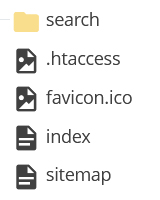Search Engine Optimization (SEO) for CMS sites
Learn about Search Engine Optimization for CMS sites.
Search Engine Optimization (SEO) is the process of improving how search engines rank your pages in search results. Search engines use a various metrics to rank pages. Follow these best practices to help optimize your site.Good content is key to good SEO results.
Focus on improving your page content to benefit your readers and improve your search engine results.
Good Content
One page, one idea
Aim to have one main idea per page. People search for information, not specific pages. A clear and focused page will help search engines (and users) know what your page is about.
Use a clear H1 heading
Each page should have exactly 1 H1 heading that isn't repeated elsewhere in the site. Use specific headings: 'About the Brain Lab' instead of 'About' (especially if your site has multiple 'about' pages).
Organize your headings
Use your headings like an organized outline. Don't skip heading levels.
Fix broken links
Use tools like Siteimprove to check your links. Prioritize your homepage and other high-traffic pages.
Check your spelling
Small spelling errors add up to bigger deductions in search rankings. Increase confidence by using the built-in spell checker in the Check Content and Submit option in the CMS.
Optimize your image sizes
Images with a large file size slow down pages (even if the image looks small on the screen). See some tips on choosing appropriate image sizes.
SEO-specific actions in the CMS
Publish your sitemap
Each CMS site has a page named 'sitemap' near your homepage ('index' in the screenshot below). This will automatically update when you add, move or remove pages in your site. Publish the sitemap whenever you make these changes.
Fill in your metadata
Complete all the metadata fields for each page in the CMS. The Title and Summary are of particular importance for SEO.
Use SEO tools
Use Siteimprove to explore SEO issues specific to your site.
About keywords
Keyword stuffing (overloading a page with keywords) is no longer effective.
You can still add keywords to your page, but you need to add them in a natural manner. For example, if your page includes some field-specific jargon, add a summary that uses common language for less technical users. Both the jargon and the common terms could include keywords.